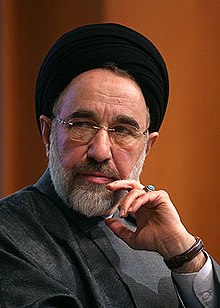Muhammad Khatami | |
|---|---|
محمد خاتمی | |
 Khatami in 2007 | |
| 5th President of Iran | |
| In office 3 August 1997 – 3 August 2005 | |
| Supreme Leader | Ali Khamenei |
| Vice President | Hassan Habibi Mohammad Reza Aref |
| Preceded by | Akbar Rafsanjani |
| Succeeded by | Mahmoud Ahmadinejad |
| Minister of Culture and Islamic Guidance | |
| In office 9 November 1982 – 24 May 1992 | |
| President | Ali Khamenei Akbar Rafsanjani |
| Prime Minister | Mir-Hossein Mousavi |
| Preceded by | Mir-Hossein Mousavi (acting) |
| Succeeded by | Ali Larijani |
| Member of the Parliament of Iran | |
| In office 28 May 1980 – 24 August 1982 | |
| Preceded by | Manouchehr Yazdi |
| Succeeded by | Mohammad Hosseininejad |
| Constituency | Yazd, Ardakan district |
| Majority | 40,112 (82.1%)[1] |
| Personal details | |
| Born | 14 October 1943 Ardakan, Yazd Province, Pahlavi Iran |
| Political party | Association of Combatant Clerics |
| Spouse | |
| Children | 3 |
| Parent |
|
| Relatives | Mohammad-Reza Khatami (brother) Ali Khatami (brother) Mohammad Reza Tabesh (nephew) |
| Alma mater | University of Isfahan University of Tehran |
| Signature |  |
| Website | Official website |
| Military service | |
| Branch/service | Iranian Imperial Army[2] |
| Years of service | 1969–1971[2] |
| Rank | Second lieutenant; Financial specialist[2] |
| Unit | Tehran region 3 sustainment[2] |
Mohammad Khatami (Persian: سید محمد خاتمی, romanized: Seyd Mohammad Khātami, pronounced [mohæmˈmæde xɒːtæˈmiː] ; born 14 October 1943)[3][4][5][6] is an Iranian reformist politician who served as the fifth president of Iran from 3 August 1997 to 3 August 2005. He also served as Iran's Minister of Culture from 1982 to 1992. Later, he was critical of the government of subsequent President Mahmoud Ahmadinejad.[7][8][9][10]
Little known internationally before becoming president, Khatami attracted attention during his first election to the presidency when he received almost 70% of the vote.[11] Khatami had run on a platform of liberalization and reform. During his election campaign, Khatami proposed the idea of Dialogue Among Civilizations as a response to Samuel P. Huntington's 1992 theory of a Clash of Civilizations.[12] The United Nations later proclaimed the year 2001 as the Year of Dialogue Among Civilizations, on Khatami's suggestion.[13][14][15] During his two terms as president, Khatami advocated freedom of expression, tolerance and civil society, constructive diplomatic relations with other states, including those in Asia and the European Union, and an economic policy that supported a free market and foreign investment.
On 8 February 2009, Khatami announced that he would run in the 2009 presidential election[16] but withdrew on 16 March in favour of his long-time friend and adviser, former prime minister of Iran Mir-Hossein Mousavi.[17] The Iranian media are forbidden on the orders of Tehran's prosecutor from publishing pictures of Khatami, or quoting his words, on account of his support for the defeated reformist candidates in the disputed 2009 re-election of Mahmoud Ahmadinejad.[18]
- ^ "Parliament members" (in Persian). Iranian Majlis. Archived from the original on 29 December 2017. Retrieved 28 October 2014.
- ^ a b c d ایران, عصر (23 January 1392). "کارت پایان خدمت خاتمی (عکس)". fa.
- ^ Esposito, John L.; Shahin, Emad El-Din (4 October 2016). The Oxford Handbook of Islam and Politics. Oxford University Press. ISBN 978-0-19-063193-2 – via Google Books.
- ^ "انتخابات92". Facebook. Archived from the original on 26 February 2022.
- ^ "عكس:جشن تولد خاتمی - تابناک | TABNAK".
- ^ "وزراي دولت اصلاحات چه آرايي از نمايندگان مجلس گرفتند؟".
- ^ "The Struggle for Iran". The Weekly Standard. 22 February 2010. Archived from the original on 28 June 2011. Retrieved 11 November 2012.
- ^ "Iran: People Rally In Ardakan In Support Of Opposition Leader Mohammad Khatami". Payvand. 17 February 2011. Archived from the original on 7 September 2018. Retrieved 11 November 2012.
- ^ "Khatami Prevented from Leaving Iran for Japan". insideIRAN. 15 April 2010. Archived from the original on 25 July 2011. Retrieved 11 November 2012.
- ^ "Karroubi Challenges Hardliners to Put Green Movement Leaders on Trial". PBS. Retrieved 11 November 2012.
- ^ "Profile: Mohammad Khatami". BBC News. 6 June 2001. Retrieved 20 May 2013.
- ^ "Khatami Speaks of Dialogue among Civilizations". diplomacy. Retrieved 11 October 2021.
- ^ "Dialogue among Civilizations". UNESCO. Archived from the original on 5 February 2007.
- ^ "Round Table: Dialogue among Civilizations United Nations, New York, 5 September 2000 Provisional verbatim transcription". UNESCO. Archived from the original on 10 March 2007.
- ^ Petito, Fabio (2004). "Khatami' Dialogue among Civilizations as International Political Theory" (PDF). International Journal of Humanities. 11 (3): 11–29.
- ^ "Iran's Khatami to run for office". BBC News. 8 February 2009. Retrieved 5 April 2010.
- ^ "Former Iranian president exits election race". The Irish Times. 3 March 2009. Retrieved 16 March 2009.
- ^ "Iran's Rouhani praises Khatami role in recent vote".